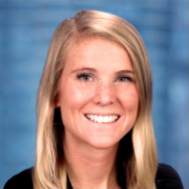The interview below is part of an ongoing effort by McGuireWoods to profile women leaders in private equity (PE). To read previous profiles, click here. To recommend a woman for a future interview, email [email protected].

Lucy King is vice president of Orangewood Partners. Prior to joining Orangewood in 2020, King was an investment banking analyst in the global industrials group at Citi where she focused on equity, debt, and M&A transactions. Prior to Citi, she was an analyst in the J.P. Morgan Private Bank in Chicago, serving high-net-worth individuals across the Midwest. King graduated in 2017 with distinction from the University of Michigan’s Ross School of Business where she earned a BBA. King was raised in Fairfield County, Connecticut.
Q: What attracted you to PE but concerned you about this career path?
Lucy King: I had a nontraditional path to PE. I started my career at J.P. Morgan Private Bank, primarily working with founders and entrepreneurs who had come into significant wealth after the sale of their business. I realized quickly that I wanted to be part of the action that came before the sale. I wanted to understand further how these businesses were built and what made them worth however many millions or billions of dollars. This led me to pursue a career switch to investment banking where I was able to build a technical foundation and further understand what makes a business tick.
While working on a strategic buyside transaction, I realized that I really enjoyed working with management teams and understanding how they make operational decisions to impact short- and long-term success. In 2020, this led to my decision to move to PE and join Orangewood Partners, an operationally focused middle market PE firm that partners with founders and management teams.
I had a few concerns when switching to PE. While the larger banks have done a better job at recruiting women and my analyst class was close to a 50-50 split between men and women, there was a drop-off in PE, especially at the smaller firms. Before a PE interview, I would look at the firm’s website and notice that often there were zero women on the investment team, which was a bit daunting. I was careful about choosing a firm that didn’t feel like a “boys club.” Orangewood has done a great job in terms of helping me find female mentors and meet other women in the industry.
Q: How do you believe women will be able to influence the PE industry, particularly as the career path continues to evolve?
LK: Women in the PE industry have a heavy focus on championing other women in the industry. There needs to be and will continue to be a focus on hiring women not only on the investment team, but also when it comes to all those involved in dealmaking. I have been working to build my female network of lawyers, financial and tax advisers, consultants, operators and other professionals, so when the time comes and I’m the one making the calls, I can build a deal team that is more heavily weighted toward women than it is today.
Q: What do you think is the biggest challenge facing women entrepreneurs today? What advice would you provide to overcome it?
LK: The biggest challenge facing women entrepreneurs today is access to capital. It’s statistically proven that women-led startups receive less investment than men-led startups. As there is a focus in PE on hiring women investment professionals, there needs to be a focus in PE on investing in female-led businesses. As the two are linked, the capital statistics will start to change as more women are in investing seats and the “like-me” effect is less skewed toward men.
I would also encourage women to not hold back when it comes to asking for financing. There is evidence that men are more likely to ask for what they want, even if they don’t believe there is a high chance of success, whereas women are more sensitive to failure and therefore don’t ask.
Q: Why is it important for more women to pursue careers in PE?
LK: More women in PE will equal more investment into female-led companies and therefore small steps to bridging the gender gap.
Q: What is a lesson you learned concerning what’s required for success in PE?
LK: You don’t have to be the smartest person in the room. Working hard, coming with a different perspective and not being afraid to share it, building relationships and championing others are the keys to success.
To contact Lucy King, email [email protected].